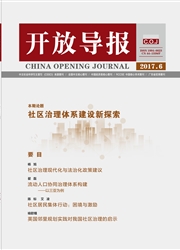

 中文摘要:
中文摘要:
调查城乡户籍统筹下重庆城郊农户市民化意愿发现,“农转城式”市民化向人口城市化的客观规律回归,乡一城“举家迁徙”移民模式成为城市化的常态,中小城市及小城镇成为大多数转户群体的首选。同时,家庭收入、受教育程度、农村土地处置及其补偿方式是影响“农转城式”市民化的主要因素,其中农村土地制度改革程度是影响户改成败的关键。本文在总结重庆户改经验的基础上,提出有序脱下农村“三件衣服”与逐渐穿上穿全城市“五件衣服”的政策建议。
 英文摘要:
英文摘要:
Though the investigation, the urban and rural household registration under overall Chongqing suburban peasant urbanization willingness,we found that the citizenization desire of "farmers to city style" returnis to the objective law of citizenization; the "migrating family style" of rural-urban immigration patterns has become the norm of citizenization; and small and medium-sized cities and small towns become the first choice of vast majority immigrants. At the same time, the major factors affecting suburban farmers' citizenization desire are still the family income, the level of education, the rural land disposal form and the compensation methods, etc. Among them, the rural land system reform is the key of success or failure to influence the household registration system reform. Based on the summary of the Chongqing Hukou reform experience, the author puts forward some suggestions about taking off the rural's "three clothes" orderly and putting on the city's "five dress" gradually.
 同期刊论文项目
同期刊论文项目
 同项目期刊论文
同项目期刊论文
 期刊信息
期刊信息
